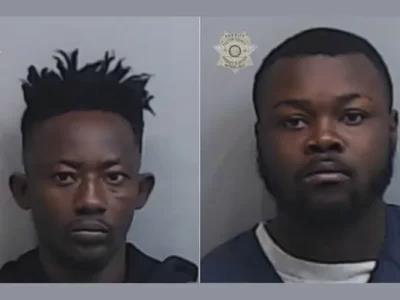A Ghanan man and his local accomplice will spend a combined twenty-seven years in prison for a string of armed robberies throughout the Marietta region.
According to Ryan Buchanan, U.S. attorney for the Northern District of Georgia, the two were involved in a crime spree on Oct. 29 and Oct. 30, 2018, beginning with the botched robbery of a CVS store in the city of South Fulton.
During the robbery, a man pointed a semi-automatic handgun at an employee and ordered her to walk to the cash register. Rather than comply, the clerk fled to the rear of the store and set off a fire alarm, thwarting the robbery.
Later that day, the same man robbed a Dollar General store in South Fulton, stealing both cash and personal property from an employee on duty. On the following day, he recruited a getaway driver, and the two robbed five businesses in South Fulton, Riverdale, College Park, and Fairburn, including a restaurant and bank.
“These individuals terrorized innocent victims and jeopardized their lives during this violent crime spree,” Buchanan said Thursday. “The men’s arrest and prosecution are an example of the excellent coordination that the FBI and our district’s local law enforcement partners routinely leverage to remove dangerous criminals from our communities.”
The case was part of Project Safe Neighborhoods, a program bringing together all levels of law enforcement to reduce violent crime and gun violence. In this instance, the Justice Department worked with the FBI, Clayton County Police Department, Clayton County Sheriff’s Office, South Fulton Police Department, and Riverdale Police Department.
Heightened Enforcement Campaigns/Multi-Agency Investigations
Project Safe Neighborhoods is one of the longest lasting, and most expensive, heightened enforcement campaigns in history. Since 2001, the federal government has awarded over $50 billion to state and local law enforcement agencies.
PSN grants usually cover the complete cost of a STEP (Selective Traffic Enforcement Program) campaign or other such effort. These costs include:
- Overtime compensation for PSN-participating officers,
- Workshops and events related to PSN support, pending approval by the Office of Justice Programs, Bureau of Justice Assistance,
- Equipment for PSN execution, and
- Printing, publication, and duplication of PSN support materials.
PSN money also covers program costs, such as payroll, rent/utilities, and travel related to PSN project evaluation and implementation.
When investors, including the federal government, put money in any enterprise, such as PSN, they expect a return. In this context, that return is not money, but arrests.
If the Department of Justice issues a PSN grant, and officers don’t make an eye-popping number of arrests, these bureaucrats face uncomfortable questions from lawmakers. If, on the other hand, the grant produces results, DOJ bureaucrats can crow about its success.
Usually, the result is a self-fulfilling prophecy. Cobb County and other entities take PSN money in order to make arrests, so that’s what they do. As a result, officers often over-rely on shaky evidence, such as eyewitness testimony, to seal the deal. More on that below.
Inter-agency communication is a related issue. Too many chefs spoil the broth. If multiple agencies investigate a crime, no one is clearly in charge. Therefore, the investigation is uneven, and defendants often suffer.
Eyewitness Evidence in Armed Robbery Cases
Eyewitness evidence may be the shakiest of all foundations for a criminal investigation. These individuals usually aren’t reliable. Then, officers use questionable tactics to identify suspects, and next use unreliable lineups to confirm the investigation’s results. Any one of these three problems gives a Marietta criminal defense lawyer an opportunity to invalidate the evidence.
Stress, and a gun in your face is certainly stressful, triggers chemical changes in the brain. Specifically, extreme stress increases the production of glucocorticoids in the brain. This hormone significantly impacts vigilance (attention) and cognition (memory). In other words, stress eyewitnesses don’t register events well and don’t remember them well.
Un-stressed eyewitness testimony isn’t much better. Our brains aren’t video cameras. We remember things selectively.
An eyewitness might provide accurate information. But this information isn’t reliable. A broken clock shows the correct time twice a day.
Next, armed with this “information,” investigators usually look for suspects in the area who match the physical description and have criminal records. In fact, they usually focus on these individuals and exclude everyone else.
For the final step, officers put suspects in lineups. If the witness and suspect are different ethnicities, cross-racial bias usually affects the results. If a white person looks at several nonwhite people (or vice-versa), and all the people are about the same weight, age, and height, they’ll all look the same. Several courts have ruled that cross-racial bias affects witness credibility.
Jail/Prison Sentences
Incarceration sucks. There’s no other way to put it. However, in many cases, a Marietta criminal defense lawyer makes this bitter pill easier to swallow. As a result, a brief incarceration term might be preferable to a long period of probation. That’s especially true if the defendant has issues with authority or problems adhering to a schedule. “Straight time” sentence alternatives usually include weekends and work release programs.
Weekends usually begin around 7:00 p.m. on Friday and end around 7:00 p.m. on Sunday. Although the defendant only serves about forty-eight hours, the defendant receives credit for three days. When jail populations swell, many sheriffs offer three-for-one credit. So, if the defendant was sentenced to thirty days and serves that time on weekends, the defendant must only serve three weekends. In many cases, those three weekends don’t have to be consecutive.
For work release defendants, jail is essentially an unpleasant hostel. Weekends and work release are also stealthy. Unless employers ask or pull the defendant’s criminal court history, they probably won’t know anything about the conviction or jail sentence.
Supervised Release Issues
As mentioned above, being on parole or probation is a lot like being under surveillance. Probation is unusually long and restrictive in Georgia. Once again, a Marietta criminal defense lawyer makes this process easier.
Felony probation could easily last ten or more years in Georgia. But for practical purposes, probation has a three-year cap. Most defendants are eligible for early discharge after they serve three years, if they’ve paid all fines, court costs, and restitution.
We stress “eligible” because judges don’t automatically grant early discharge petitions. A Marietta criminal defense lawyer must prove that early discharge is in the best interests of society. Normally, if the defendant’s probation officer approves the petition, the judge approves it as well.
The judge may modify the terms and conditions of probation at any time. Residency rules may be the most frequent modification. For example, if the judge says that you must live with your sister for the duration of your probation, you must do it, even if your parents’ house is closer to your work and you get along better with them than with your sister.
An arrest doesn’t necessarily ruin your life, and neither does a conviction. For a free consultation with an experienced Marietta criminal defense lawyer, contact The Phillips Law Firm, LLC. The sooner you reach out to us, the sooner we start working for you.



 Election Day and Criminal Law in Georgia
Election Day and Criminal Law in Georgia